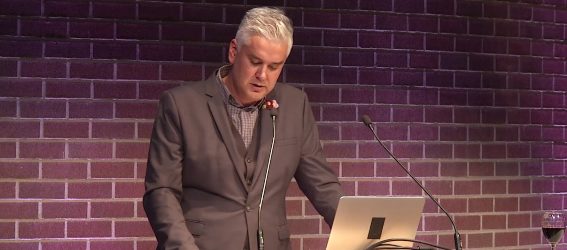Glen Coulthard: Reconciliation, Recognition, and Resentment in Indigenous Politics

In the vast landscapes of Canada, where history intertwines with the present, and the voices of Indigenous peoples echo through time, the story of reconciliation takes center stage. At the heart of this narrative is Glen Coulthard, a prominent figure in the realm of Indigenous politics and a critical thinker on the complexities of reconciliation, recognition, and resentment. In this article, we delve into the profound insights of Coulthard’s work and explore how his perspective has reshaped the discourse on Aboriginal issues in Canada.
The Setting: Blatchford Lake and Dechinta
Our journey begins beside the serene Blatchford Lake, north of Yellowknife, where Dechinta Bush University stands as a beacon of education for both Aboriginal and non-Aboriginal individuals. It’s here that we encounter Glen Coulthard, a member of the Yellowknives Dene and an assistant professor of political science at the University of British Columbia. Standing before him are none other than Kate Middleton and Prince William, embarking on their 2011 honeymoon through Canada’s northern territories.
But this encounter is far from ordinary. Coulthard, a leading advocate for Indigenous reconciliation, grapples with the complex emotions stirred by the Royal couple’s presence. He questions the appropriateness of teaching them about his community’s history, given the historical implications of the British empire’s colonial policies. Coulthard remarks, “I wasn’t convinced that it was a conversation that should be even had.”
A Transformative Story
However, a remarkable story changes Coulthard’s perspective. He recounts an incident from 1970 when his grandfather loaned his boat to the Canadian government, only to have it returned in a state of irreparable damage. Ottawa refused to compensate his grandfather for the loss. In a twist of fate, the community wrote a letter to the Royal family, leading to their decision to compensate for the damaged boat.
This narrative encapsulates a profound shift in reconciliation. It’s not just about Indigenous peoples forgiving past wrongs; it’s a two-way interaction. Coulthard welcomed the Royal couple, symbols of contemporary colonialism, because they had actively reconciled with his family by compensating his grandfather. During their visit, Coulthard explained the ongoing impacts of colonialism to the Royals, shedding light on its enduring effects on the Yellowknives.
Resentment as a Sign of Critical Consciousness
In the context of settler colonialism, resentment takes on a new meaning. Rather than a negative emotion to be overcome, it becomes a sign of critical consciousness—a recognition of ongoing injustices. Coulthard asserts that resentment can serve as a catalyst for action, challenging individuals to address the nagging injustices in the world.
Recognition: A Flawed Paradigm
Coulthard’s work extends beyond reconciliation to another crucial ‘R’ word: recognition. He questions the widely held belief that recognition can rectify the political structures marginalizing Indigenous peoples. Instead, he argues that the politics of recognition often reinforce colonial power dynamics. Indigenous demands for recognition often result in narrow concessions, not true self-determination.
Reconciliation with Canada: A Complex Paradox
To reconcile Indigenous rights and title, Canada seeks to reconcile them with its sovereignty, but this approach often overlooks the present and future consequences. Coulthard describes reconciliation as an effort to “move on” from the past, which leaves the current issues inadequately addressed. This creates an ironic paradox where the term ‘reconciliation’ is used by the state, which may hinder true reconciliation.
Resentment as a Path Forward
In Glen Coulthard’s book, “Seeing Red: On Recognition, Reconciliation, and Resentment in Indigenous Politics,” Coulthard argues that resentment should not be dismissed but embraced. It signifies a critical awareness of ongoing injustices and can motivate individuals to take action.
Idle No More: An Awakening
The politics of recognition and reconciliation reached a turning point around December 2012 with the Idle No More movement. While some viewed the movement as a sign that Indigenous communities should move on, Coulthard saw it differently. He saw an awakening among both Indigenous and non-Indigenous people, a realization of the destructive and oppressive nature of the current situation.
Can Change Be Achieved?
The question remains: can Canada, as a state, change its position to accept calls for recognition and reconciliation? Coulthard remains optimistic, emphasizing the need for genuine motivation among non-Indigenous Canadians to address the ongoing relationship with Indigenous peoples. He envisions a two-way reconciliation where both parties engage in addressing present issues rather than dwelling solely on the past. Glen Coulthard’s work has reshaped the discourse on reconciliation, recognition, and resentment in Indigenous politics. His insights challenge the conventional wisdom and offer a fresh perspective on how Canada can move forward towards a more equitable and just future for all its citizens.

